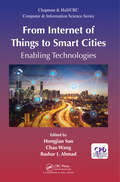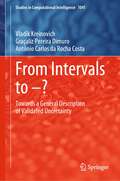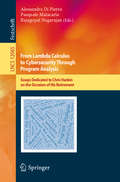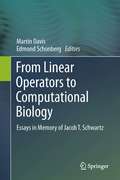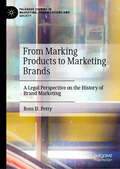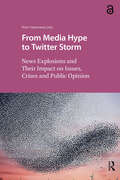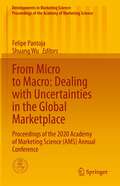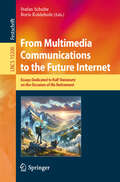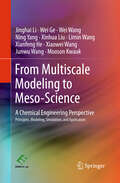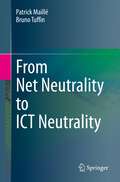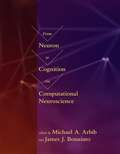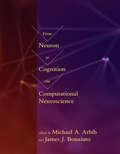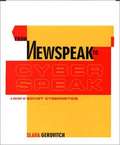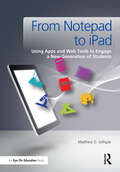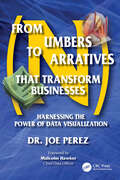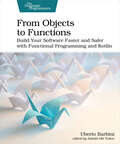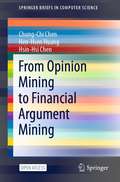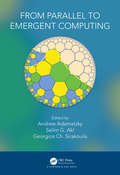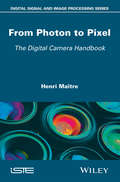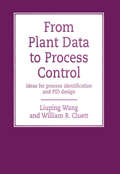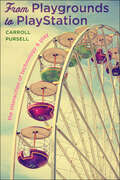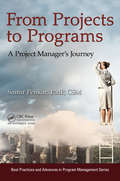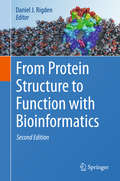- Table View
- List View
From Internet of Things to Smart Cities: Enabling Technologies (Chapman & Hall/CRC Computer and Information Science Series)
by Chao Wang Hongjian Sun Bashar AhmadFrom Internet of Things to Smart Cities: Enabling Technologies explores the information and communication technologies (ICT) needed to enable real-time responses to current environmental, technological, societal, and economic challenges. ICT technologies can be utilized to help with reducing carbon emissions, improving resource utilization efficiency, promoting active engagement of citizens, and more. This book aims to introduce the latest ICT technologies and to promote international collaborations across the scientific community, and eventually, the general public. It consists of three tightly coupled parts. The first part explores the involvement of enabling technologies from basic machine-to-machine communications to Internet of Things technologies. The second part of the book focuses on state of the art data analytics and security techniques, and the last part of the book discusses the design of human-machine interfaces, including smart home and cities. Features Provides an extended literature review of relevant technologies, in addition to detailed comparison diagrams, making new readers be easier to grasp fundamental and wide knowledge Contains the most recent research results in the field of communications, signal processing and computing sciences for facilitating smart homes, buildings, and cities Includes future research directions in Internet of Things, smart homes, smart buildings, smart grid, and smart cities Presents real examples of applying these enabling technologies to smart homes, transportation systems and cities With contributions from leading experts, the book follows an easy structure that not only presents timely research topics in-depth, but also integrates them into real world applications to help readers to better understand them.
From Intervals to –?: Towards a General Description of Validated Uncertainty (Studies in Computational Intelligence #1041)
by Vladik Kreinovich Graçaliz Pereira Dimuro Antônio Carlos da Rocha CostaThis book is about methodological aspects of uncertainty propagation in data processing. Uncertainty propagation is an important problem: while computer algorithms efficiently process data related to many aspects of their lives, most of these algorithms implicitly assume that the numbers they process are exact. In reality, these numbers come from measurements, and measurements are never 100% exact. Because of this, it makes no sense to translate 61 kg into pounds and get the result—as computers do—with 13 digit accuracy. In many cases—e.g., in celestial mechanics—the state of a system can be described by a few numbers: the values of the corresponding physical quantities. In such cases, for each of these quantities, we know (at least) the upper bound on the measurement error. This bound is either provided by the manufacturer of the measuring instrument—or is estimated by the user who calibrates this instrument. However, in many other cases, the description of the system is more complex than a few numbers: we need a function to describe a physical field (e.g., electromagnetic field); we need a vector in Hilbert space to describe a quantum state; we need a pseudo-Riemannian space to describe the physical space-time, etc. To describe and process uncertainty in all such cases, this book proposes a general methodology—a methodology that includes intervals as a particular case. The book is recommended to students and researchers interested in challenging aspects of uncertainty analysis and to practitioners who need to handle uncertainty in such unusual situations.
From Lambda Calculus to Cybersecurity Through Program Analysis: Essays Dedicated to Chris Hankin on the Occasion of His Retirement (Lecture Notes in Computer Science #12065)
by Alessandra Di Pierro Pasquale Malacaria Rajagopal NagarajanThis Festschrift is in honor of Chris Hankin, Professor at the Imperial College in London, UK, on the Occasion of His 65th Birthday.Chris Hankin is a Fellow of the Institute for Security Science and Technology and a Professor of Computing Science.His research is in cyber security, data analytics and semantics-based program analysis. He leads multidisciplinary projects focused on developing advanced visual analytics and providing better decision support to defend against cyber attacks. This Festschrift is a collection of scientific contributions related to the topics that have marked the research career of Professor Chris Hankin. The contributions have been written to honour Chris' career and on the occasion of his retirement.
From Linear Operators to Computational Biology
by Martin Davis Edmond SchonbergIn his rich and varied career as a mathematician, computer scientist, and educator, Jacob T. Schwartz wrote seminal works in analysis, mathematical economics, programming languages, algorithmics, and computational geometry. In this volume of essays, his friends, students, and collaborators at the Courant Institute of Mathematical Sciences present recent results in some of the fields that Schwartz explored: quantum theory, the theory and practice of programming, program correctness and decision procedures, dextrous manipulation in Robotics, motion planning, and genomics. In addition to presenting recent results in these fields, these essays illuminate the astonishingly productive trajectory of a brilliant and original scientist and thinker.
From Mainframes to Smartphones
by Martin Campbell-Kelly Daniel D. Garcia-SwartzThis compact history traces the computer industry from its origins in 1950s mainframes, through the establishment of standards beginning in 1965 and the introduction of personal computing in the 1980s. It concludes with the Internet’s explosive growth since 1995. <P><P>Across these four periods, Martin Campbell-Kelly and Daniel Garcia-Swartz describe the steady trend toward miniaturization and explain its consequences for the bundles of interacting components that make up a computer system. With miniaturization, the price of computation fell and entry into the industry became less costly. Companies supplying different components learned to cooperate even as they competed with other businesses for market share. Simultaneously with miniaturization―and equally consequential―the core of the computer industry shifted from hardware to software and services. Companies that failed to adapt to this trend were left behind.
From Marking Products to Marketing Brands: A Legal Perspective on the History of Brand Marketing (Palgrave Studies in Marketing, Organizations and Society)
by Ross D. PettyThis book examines the historical evolution from marking or branding products for ownership purposes to branding products in order to promote the brand itself. In the extreme, some modern brands so strongly promote their brand image or personality that there is little emphasis on promoting the branded products themselves. Central to this evolution is the development and protection of brand identifiers, such as names, logos, and more, as well as the development of registration and conflict-resolution systems to resolve disputes regarding brand identifier similarities. The author meticulously navigates the historical evolution of brand marketing, elucidating the manner in which this practice has evolved over time. To get a sense of how much brand marketing has grown, he examines advertising expenditures, the scholarly and professional literature, a few case studies, and the growing number of brand identifier registrations and disputes. He examines several legal areas including trademarks, unfair competition, copyrights, design patents and even antitrust law. In modern times, the legal system not only enables brand marketing but sets limits on it as well. The book concludes by examining some modern developments that are testing the limits. Catering to researchers vested in the realms of advertising and marketing history as well as law, this landmark text provides a thorough survey of brand marketing and its regulatory landscape.
From Media Hype to Twitter Storm: News Explosions and Their Impact on Issues, Crises and Public Opinion
by Peter VastermanThe word media hype is often used as rhetorical argument to dismiss waves of media attention as overblown, disproportional and exaggerated. But these explosive news waves, as well as - nowadays - the twitter storms, are object of scientific research, because they are an important phenomenon in the public area. Sometimes it is indeed 'much ado about nothing' but in many cases these media storms have play an important role in political issues, scandals and crises. Twitter storms sometimes ruin reputations within hours. Although different concepts are used, such as media hypes, news waves, media storms, information cascades or risk amplification, all the studies in this book refer to the same process in which key events trigger a chain of reactions and interactions, building up huge news waves in the media or rapidly spreading social epidemics in the social media. This book offers the first comprehensive overview of this important topic. It is not only interesting for scholars and students in media and journalism, but also for professionals in PR and communication, crisis communication and reputation management.
From Micro to Macro: Proceedings of the 2019 Academy of Marketing Science (AMS) Annual Conference (Developments in Marketing Science: Proceedings of the Academy of Marketing Science)
by Shuang Wu Felipe PantojaThe focus of the volume is on dealing with uncertainties and challenges within the global marketplace brought by digital technology companies that are leveraging artificial intelligence, machine learning, cloud computing, robotic automation, augmented reality, and other recent advancements. Additionally, these companies operate in the sharing economy and offer collaborative consumption opportunities. Featuring contributions presented at the 2020 Academy of Marketing Science (AMS) Virtual Annual Conference, the enclosed contributions assess the impact of these radical and disruptive innovations on long-standing incumbents and traditional industries, as well as consumer experiences. Founded in 1971, the Academy of Marketing Science is an international organization dedicated to promoting timely explorations of phenomena related to the science of marketing in theory, research, and practice. Among its services to members and the community at large, the Academy offers conferences, congresses, and symposia that attract delegates from around the world. Presentations from these events are published in this Proceedings series, which offers a comprehensive archive of volumes reflecting the evolution of the field. Volumes deliver cutting-edge research and insights, complementing the Academy’s flagship journals, the Journal of the Academy of Marketing Science (JAMS) and AMS Review. Volumes are edited by leading scholars and practitioners across a wide range of subject areas in marketing science
From Multimedia Communications to the Future Internet: Essays Dedicated to Ralf Steinmetz on the Occasion of His Retirement (Lecture Notes in Computer Science #15200)
by Stefan Schulte Boris KoldehofeThis Festschrift is dedicated to Ralf Steinmetz on the occasion of his retirement. The honoree is a full professor at the Technical University of Darmstadt in Germany, where he leads the Multimedia Communications lab. He has supervised over 105 successful PhD students and remains committed to his vision of achieving “seamless adaptive multimedia communications.” He has been widely recognized for his contributions to the field, prestigious accolades include an Honorary Doctorate from RWTH Aachen University and a Chair of Excellence at the University Carlos III de Madrid. He is also a fellow of several esteemed professional organizations, including the IEEE, the ACM, the GI, and the VDE ITG. A pioneer in multimedia and networking, Ralf Steinmetz’s work opened up further research in topics such as distributed systems, e-learning, and serious games. The contributions in this volume reflect his huge impact on research, technical developments, and careers in the areas of multimedia and networking: in Part I, the chapters discuss past research results and their impact, often applying a survey style; in Part II, researchers present current results; and in Part III, the chapters give an outlook on future research directions.
From Multiscale Modeling to Meso-Science
by Wei Wang Limin Wang Jinghai Li Junwu Wang Mooson Kwauk Ning Yang Wei Ge Xianfeng He Xiaowei Wang Xinhua LiuMultiscale modeling is becoming essential for accurate, rapid simulation in science and engineering. This book presents the results of three decades of research on multiscale modeling in process engineering from principles to application, and its generalization for different fields. This book considers the universality of meso-scale phenomena for the first time, and provides insight into the emerging discipline that unifies them, meso-science, as well as new perspectives for virtual process engineering. Multiscale modeling is applied in areas including: multiphase flow and fluid dynamicschemical, biochemical and process engineeringmineral processing and metallurgical engineeringenergy and resourcesmaterials science and engineeringJinghai Li is Vice-President of the Chinese Academy of Sciences (CAS), a professor at the Institute of Process Engineering, CAS, and leader of the EMMS (Energy-minimizing multiscale) Group. Wei Ge, Wei Wang, Ning Yang and Junwu Wang are professors at the EMMS Group, part of the Institute of Process Engineering, CAS. Xinhua Liu, Limin Wang, Xianfeng He and Xiaowei Wang are associate professors at the EMMS Group, part of the Institute of Process Engineering, CAS. Mooson Kwauk is an emeritus director of the Institute of Process Engineering, CAS, and is an advisor to the EMMS Group.
From Net Neutrality to ICT Neutrality
by Patrick Maillé Bruno TuffinThis book discusses the pros and cons of information and communication (ICT) neutrality. It tries to be as objective as possible from arguments of proponents and opponents, this way enabling readers to build their own opinion. It presents the history of the ongoing network neutrality debate, the various concepts it encompasses, and also some mathematical developments illustrating optimal strategies and potential counter-intuitive results, then extends the discussion to connected ICT domains. The book thus touches issues related to history, economics, law, networking, and mathematics. After an introductory chapter on the history of the topic, chapter 2 surveys and compares the various laws in place worldwide and discusses some implications of heterogeneous rules in several regions. Next, chapter 3 details the arguments put forward by the participants of the net neutrality debate. Chapter 4 then presents how the impact of neutral or non-neutral behaviors can be analyzed mathematically, with sometimes counter-intuitive results, and emphasizes the interest of modeling to avoid bad decisions. Chapter 5 illustrates that content providers may not always be on the pro-neutrality side, as there are situations where they may have an economic advantage with a non-neutral situation, e.g. when they are leaders on a market and create barriers to entry for competitors. Another related issue is covered in chapter 6, which discusses existing ways for ISPs to circumvent the packet-based rules and behave non-neutral without breaking the written law. Chapter 7 gives more insight on the role and possible non-neutral behavior of search engines, leading to another debate called the search neutrality debate. Chapter 8 focuses on e-commerce platforms and social networks, and investigates how they can influence users’ actions and opinions. The issue is linked to the debate on the transparency of algorithms which is active in Europe especially. Chapter 9 focuses on enforcing neutrality in practice through measurements: indeed, setting rules requires monitoring the activity of ICT actors in order to sanction non-appropriate behaviors and be proactive against new conducts. The chapter explains why this is challenging and what tools are currently available. Eventually, Chapter 10 briefly concludes the presentation and opens the debate.
From Neuron to Cognition via Computational Neuroscience
by Michael A. Arbib James J. BonaiutoThis textbook presents a wide range of subjects in neuroscience from a computational perspective. It offers a comprehensive, integrated introduction to core topics, using computational tools to trace a path from neurons and circuits to behavior and cognition. Moreover, the chapters show how computational neuroscience -- methods for modeling the causal interactions underlying neural systems -- complements empirical research in advancing the understanding of brain and behavior. The chapters -- all by leaders in the field, and carefully integrated by the editors -- cover such subjects as action and motor control; neuroplasticity, neuromodulation, and reinforcement learning; vision; and language -- the core of human cognition.The book can be used for advanced undergraduate or graduate level courses. It presents all necessary background in neuroscience beyond basic facts about neurons and synapses and general ideas about the structure and function of the human brain. Students should be familiar with differential equations and probability theory, and be able to pick up the basics of programming in MATLAB and/or Python. Slides, exercises, and other ancillary materials are freely available online, and many of the models described in the chapters are documented in the brain operation database, BODB (which is also described in a book chapter).ContributorsMichael A. Arbib, Joseph Ayers, James Bednar, Andrej Bicanski, James J. Bonaiuto, Nicolas Brunel, Jean-Marie Cabelguen, Carmen Canavier, Angelo Cangelosi, Richard P. Cooper, Carlos R. Cortes, Nathaniel Daw, Paul Dean, Peter Ford Dominey, Pierre Enel, Jean-Marc Fellous, Stefano Fusi, Wulfram Gerstner, Frank Grasso, Jacqueline A. Griego, Ziad M. Hafed, Michael E. Hasselmo, Auke Ijspeert, Stephanie Jones, Daniel Kersten, Jeremie Knuesel, Owen Lewis, William W. Lytton, Tomaso Poggio, John Porrill, Tony J. Prescott, John Rinzel, Edmund Rolls, Jonathan Rubin, Nicolas Schweighofer, Mohamed A. Sherif, Malle A. Tagamets, Paul F. M. J. Verschure, Nathan Vierling-Claasen, Xiao-Jing Wang, Christopher Williams, Ransom Winder, Alan L. Yuille
From Neuron to Cognition via Computational Neuroscience (Computational Neuroscience Series)
by Michael A. Arbib James J. BonaiutoA comprehensive, integrated, and accessible textbook presenting core neuroscientific topics from a computational perspective, tracing a path from cells and circuits to behavior and cognition.This textbook presents a wide range of subjects in neuroscience from a computational perspective. It offers a comprehensive, integrated introduction to core topics, using computational tools to trace a path from neurons and circuits to behavior and cognition. Moreover, the chapters show how computational neuroscience—methods for modeling the causal interactions underlying neural systems—complements empirical research in advancing the understanding of brain and behavior. The chapters—all by leaders in the field, and carefully integrated by the editors—cover such subjects as action and motor control; neuroplasticity, neuromodulation, and reinforcement learning; vision; and language—the core of human cognition.The book can be used for advanced undergraduate or graduate level courses. It presents all necessary background in neuroscience beyond basic facts about neurons and synapses and general ideas about the structure and function of the human brain. Students should be familiar with differential equations and probability theory, and be able to pick up the basics of programming in MATLAB and/or Python. Slides, exercises, and other ancillary materials are freely available online, and many of the models described in the chapters are documented in the brain operation database, BODB (which is also described in a book chapter).ContributorsMichael A. Arbib, Joseph Ayers, James Bednar, Andrej Bicanski, James J. Bonaiuto, Nicolas Brunel, Jean-Marie Cabelguen, Carmen Canavier, Angelo Cangelosi, Richard P. Cooper, Carlos R. Cortes, Nathaniel Daw, Paul Dean, Peter Ford Dominey, Pierre Enel, Jean-Marc Fellous, Stefano Fusi, Wulfram Gerstner, Frank Grasso, Jacqueline A. Griego, Ziad M. Hafed, Michael E. Hasselmo, Auke Ijspeert, Stephanie Jones, Daniel Kersten, Jeremie Knuesel, Owen Lewis, William W. Lytton, Tomaso Poggio, John Porrill, Tony J. Prescott, John Rinzel, Edmund Rolls, Jonathan Rubin, Nicolas Schweighofer, Mohamed A. Sherif, Malle A. Tagamets, Paul F. M. J. Verschure, Nathan Vierling-Claasen, Xiao-Jing Wang, Christopher Williams, Ransom Winder, Alan L. Yuille
From Newspeak to Cyberspeak: A History of Soviet Cybernetics
by Slava GerovitchSlava argues that Soviet cybernetics was not just an intellectual trend but a social movement for radical reform in science and society as a whole. Followers of cybernetics viewed computer simulation as a universal method of problem solving
From Notepad to iPad: Using Apps and Web Tools to Engage a New Generation of Students
by Matthew GillispieThis book is a one-stop-shop for secondary teachers looking to use iPads effectively in the classroom. The author provides a clear and practical overview of how to implement the technology, manage it, and use it successfully. Each chapter is full of tips and engaging classroom activities. Teachers at all levels of experience and comfort with technology will benefit from the ideas and resources in this book. Special Features: Screen shots and other visuals to help you use the recommended apps and websites Strategies for managing technology use in the classroom Lesson plans that effectively teach literacy and content through the use of technology Connections to the Common Core State Standards Samples of student work using iPads Rubrics for a variety of suggested assignments
From Numbers to Narratives that Transform Businesses: Harnessing the Power of Data Visualization
by Joe PerezThis book shows the reader how to transform cold numbers into captivating narratives that drive business success. Master the art and science of data storytelling, blend logic with creativity, and turn insights into action. Learn to craft stunning visuals, navigate data-driven decisions, and infuse your data with key principles for maximum impact. This book is your roadmap to turning data from mere information into a powerful catalyst for transformation.
From Objects to Functions: Build Your Software Faster And Safer With Functional Programming And Kotlin
by Uberto BarbiniBuild applications quicker and with less effort using functional programming and Kotlin. Learn by building a complete application, from gathering requirements to delivering a microservice architecture following functional programming principles. Learn how to implement CQRS and EventSourcing in a functional way to map the domain into code better and to keep the cost of change low for the whole application life cycle. If you're curious about functional programming or you are struggling with how to put it into practice, this guide will help you increase your productivity composing small functions together instead of creating fat objects. Switching to the functional paradigm isn't easy when you're used to object-oriented programming. You need more than just lambdas and mapping over collections to get a declarative style and disentangle the state from the computations. Use transformations and compositions to help you write less code with better results. Boost your productivity and harness the power of functional programming by creating real-world applications rather than focusing on theoretical concepts. Work through a series of short exercises to find and compose pure functions, and create data structures that work like algebra. Get rid of mutable state in your software to eliminate the main source of bugs. Apply CQRS and EventSourcing patterns to translate stakeholder requirements into functional design and then into code. See how Kotlin's easy-to-learn syntax and functional-friendly approach make it a great option for a pragmatic language that integrates well with existing Java code and libraries. Leverage functional programming to build and deliver robust applications in less time and with fewer defects. What You Need: The code in this book is designed to allow you to build your application from scratch on Windows, Mac and Linux. You will need a recent IDE, we recommend IntelliJ Community Edition, and Kotlin 1.3.x or later.
From Opinion Mining to Financial Argument Mining (SpringerBriefs in Computer Science)
by Chung-Chi Chen Hen-Hsen Huang Hsin-Hsi ChenOpinion mining is a prevalent research issue in many domains. In the financial domain, however, it is still in the early stages. Most of the researches on this topic only focus on the coarse-grained market sentiment analysis, i.e., 2-way classification for bullish/bearish. Thanks to the recent financial technology (FinTech) development, some interdisciplinary researchers start to involve in the in-depth analysis of investors' opinions. These works indicate the trend toward fine-grained opinion mining in the financial domain. When expressing opinions in finance, terms like bullish/bearish often spring to mind. However, the market sentiment of the financial instrument is just one type of opinion in the financial industry. Like other industries such as manufacturing and textiles, the financial industry also has a large number of products. Financial services are also a major business for many financial companies, especially in the context of the recent FinTech trend. For instance, many commercial banks focus on loans and credit cards. Although there are a variety of issues that could be explored in the financial domain, most researchers in the AI and NLP communities only focus on the market sentiment of the stock or foreign exchange. This open access book addresses several research issues that can broaden the research topics in the AI community. It also provides an overview of the status quo in fine-grained financial opinion mining to offer insights into the futures goals. For a better understanding of the past and the current research, it also discusses the components of financial opinions one-by-one with the related works and highlights some possible research avenues, providing a research agenda with both micro- and macro-views toward financial opinions.
From Parallel to Emergent Computing
by Andrew Adamatzky Selim Akl Georgios SirakoulisModern computing relies on future and emergent technologies which have been conceived via interaction between computer science, engineering, chemistry, physics and biology. This highly interdisciplinary book presents advances in the fields of parallel, distributed and emergent information processing and computation. The book represents major breakthroughs in parallel quantum protocols, elastic cloud servers, structural properties of interconnection networks, internet of things, morphogenetic collective systems, swarm intelligence and cellular automata, unconventionality in parallel computation, algorithmic information dynamics, localized DNA computation, graph-based cryptography, slime mold inspired nano-electronics and cytoskeleton computers. Features Truly interdisciplinary, spanning computer science, electronics, mathematics and biology Covers widely popular topics of future and emergent computing technologies, cloud computing, parallel computing, DNA computation, security and network analysis, cryptography, and theoretical computer science Provides unique chapters written by top experts in theoretical and applied computer science, information processing and engineering From Parallel to Emergent Computing provides a visionary statement on how computing will advance in the next 25 years and what new fields of science will be involved in computing engineering. This book is a valuable resource for computer scientists working today, and in years to come.
From Photon to Pixel
by Henri MaitreThe digital camera conceals remarkable technological innovations that affect the formation of the image, the color representation or automated measurements and settings. ** From photon to pixel photon ** describes the device both from the point of view of the physics of the phenomena involved, as technical components and software it uses. Based on the perceptual properties of the visual system as well as on standard transmission and representation, analyzes the solutions to meet the demands of the photographer on the development, contrast, white balance or stabilization of image. The advanced architectures adopted in mobile phones and developments of computational photography are also presented, foreshadowing the features of the future device.
From Plant Data to Process Control: Ideas for Process Identification and PID Design
by Liuping WangProcess engineering spans industrial applications in the manufacturing sector from petrochemical to polymer to mineral production. From Plant Data to Process Control covers the most up-to-date techniques and algorithms in the area of process identification (PID) and process control, two key components of process engineering, essential for optimizin
From Playgrounds to PlayStation: The Interaction of Technology and Play
by Carroll PursellHow technology shapes play in America—and vice versa.In this romp through the changing landscape of nineteenth- and twentieth-century American toys, games, hobbies, and amusements, senior historian of technology Carroll Pursell poses a simple but interesting question: What can we learn by studying the relationship between technology and play? From Playgrounds to PlayStation explores how play reflects and drives the evolution of American culture. Pursell engagingly examines the ways in which technology affects play and play shapes people. The objects that children (and adults) play with and play on, along with their games and the hobbies they pursue, can reinforce but also challenge gender roles and cultural norms. Inventors—who often talk about "playing" at their work, as if motivated by the pure fun of invention—have used new materials and technologies to reshape sports and gameplay, sometimes even crafting new, extreme forms of recreation, but always responding to popular demand.Drawing from a range of sources, including scholarly monographs, patent records, newspapers, and popular and technical journals, the book covers numerous modes and sites of play. Pursell touches on the safety-conscious playground reform movement, the dazzling mechanical innovations that gave rise to commercial amusement parks, and the media's colorful promotion of toys, pastimes, and sporting events. Along the way, he shows readers how technology enables the forms, equipment, and devices of play to evolve constantly, both reflecting consumer choices and driving innovators and manufacturers to promote toys that involve entirely new kinds of play—from LEGOs and skateboards to beading kits and videogames.
From Police to Security Professional: A Guide to a Successful Career Transition
by Michael S. D'AngeloFormer police and military personnel possess attractive skill sets for the private security industry; however, the transition to the corporate arena is not without challenges. Competition for these jobs is fierce. Many candidates possess degrees in security management‘some having spent their entire professional careers in private security. From Police to Security Professional: A Guide to a Successful Career Transition provides tips on overcoming the inherent obstacles law enforcement professionals face in making the switch and supplies a practical roadmap for entry into the private security world.The foundation of the book comes from the author‘s own journey and the many hurdles he encountered transitioning to private sector security. With his help, you‘ll learn: The unique skills, experience, and mentality required to enter into the private security industry from a law enforcement background The opportunities available and the different areas within the industry including benefits and income potential How to properly evaluate your training portfolio How to tailor your resume to garner the attention of hiring executives The many professional associations and certifications that could be helpful in your career Vital to your ability to succeed is understanding that security management has evolved into a distinct profession in its own right one that brings with it different education, experience, and skill sets that clearly differentiate it from law enforcement. This book will help you better understand and be prepared for the policies, processes, and a corporate environment that operates in a very different way than the police structure to which you are accustomed.
From Projects to Programs: A Project Manager's Journey (Best Practices in Portfolio, Program, and Project Management #8)
by Samir PenkarThis book tells the story of an up-and-coming project manager that's been handed a large program to lead. Readers follow along as she struggles, leads, stumbles, and grows into the program manager role. Introducing key program management concepts throughout, the book provides a backstage view into the workings of program management, program organization, team dynamics, and the skills required to manage programs. Told through the eyes of a program manager, readers will experience the ins and outs of program management.
From Protein Structure to Function with Bioinformatics
by Daniel J. RigdenThis book is about protein structural bioinformatics and how it can help understand and predict protein function. It covers structure-based methods that can assign and explain protein function based on overall folds, characteristics of protein surfaces, occurrence of small 3D motifs, protein-protein interactions and on dynamic properties. Such methods help extract maximum value from new experimental structures, but can often be applied to protein models. The book also, therefore, provides comprehensive coverage of methods for predicting or inferring protein structure, covering all structural classes from globular proteins and their membrane-resident counterparts to amyloid structures and intrinsically disordered proteins. The book is split into two broad sections, the first covering methods to generate or infer protein structure, the second dealing with structure-based function annotation. Each chapter is written by world experts in the field. The first section covers methods ranging from traditional homology modelling and fold recognition to fragment-based ab initio methods, and includes a chapter, new for the second edition, on structure prediction using evolutionary covariance. Membrane proteins and intrinsically disordered proteins are each assigned chapters, while two new chapters deal with amyloid structures and means to predict modes of protein-protein interaction. The second section includes chapters covering functional diversity within protein folds and means to assign function based on surface properties and recurring motifs. Further chapters cover the key roles of protein dynamics in protein function and use of automated servers for function inference. The book concludes with two chapters covering case studies of structure prediction, based respectively on crystal structures and protein models, providing numerous examples of real-world usage of the methods mentioned previously. This book is targeted at postgraduate students and academic researchers. It is most obviously of interest to protein bioinformaticians and structural biologists, but should also serve as a guide to biologists more broadly by highlighting the insights that structural bioinformatics can provide into proteins of their interest.
